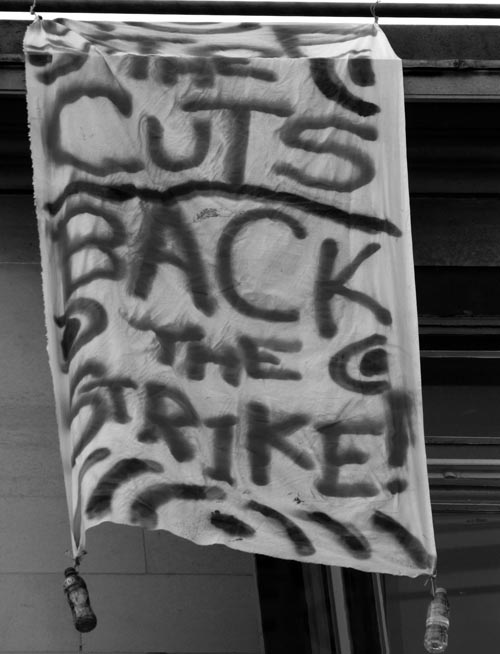Leeds lecturers fight job loss
WORKERS, MARCH 2010 ISSUE
ACADEMICS AT the University of Leeds are preparing for three days of strike action as part of their campaign against threatened compulsory redundancies in Biological Sciences and a £35 million cut across the university which would mean hundreds of job losses.

|
|
Homemade student banner supporting the faculty action at Leeds University. Photo: Workers |
The campaign took off when the university announced in November it needed to slash next year’s budget ahead of the looming government cutbacks in funding of Higher Education. Every School in the university was told to start looking for cuts in budgets of 10 per cent. A cut of this dimension across the university would mean a loss of up to 700 jobs. The Faculty of Biological Sciences has been targeted for cuts during the whole of last year, along with the School of Health Care, and together they have already lost 54 jobs. Now they will not rule out making people, including key professors, compulsorily redundant in the latest round of restructuring, forcing all staff in Biological Sciences to apply for a new set of posts, putting 20 jobs at risk.
The response by the University and Colleges Union UCU to this attack on Biological Sciences has been measured and organised. The Leeds University branch is one of the largest in the country. At the forefront of some previous national battles but this is the first time it has balloted for local action. The UCU’s national leaders see the significance and put in extra resources to ensure a good turnout and vote in the ballot. Turnout was the highest in the union’s history: 66 per cent with an overwhelming vote for action.
There was an Obama-style campaign, “knocking on every office door” to prompt people to vote, and online campaigns. One, by the full-time officers of the student union, who oppose the lecturers’ action, organised a spam whereby any student clicking on a link to read their article had an automated message sent to their lecturer contacts urging them to vote No. This was exposed as illegal by UCU, and many students were outraged. It prompted several Facebook groups backing the strikes and there is now an active Students Against the Cuts movement. Leeds UCU has an fine blog, www.leedsucu.wordpress.com. Action begins with one-day strikes on 24 February, 2 March and 4 March, and a rally and march by union members from across the region in support of the campaign Defend Jobs Defend Education at 1pm on 4 March meeting on the university’s Parkinson Steps.
ACAS-mediated talks have not succeeded in averting the strikes so far as the management walked out still refusing to rule out compulsory redundancies in Biological Sciences. Previously the union had called on the vice-chancellor, Professor Michael Arthur, to rebuild trust with staff by putting his plans for mass job losses on hold and by working together with the union to oppose funding cuts in higher education.
In a recent development Leeds University has put its overall cost cutting plans on hold following claims it broke key rules about how it is regulated. The investigation is to be headed, ironically, by Peter Mandelson in his capacity as the university’s Visitor, or Lord President of the Council – a sort of ombudsman for the university. Lord Mandelson’s intervention came just 24 hours after UCU announced its plans to take the industrial action. But the university has still not ruled out the possibility of compulsory redundancies so the strikes are set to go ahead.